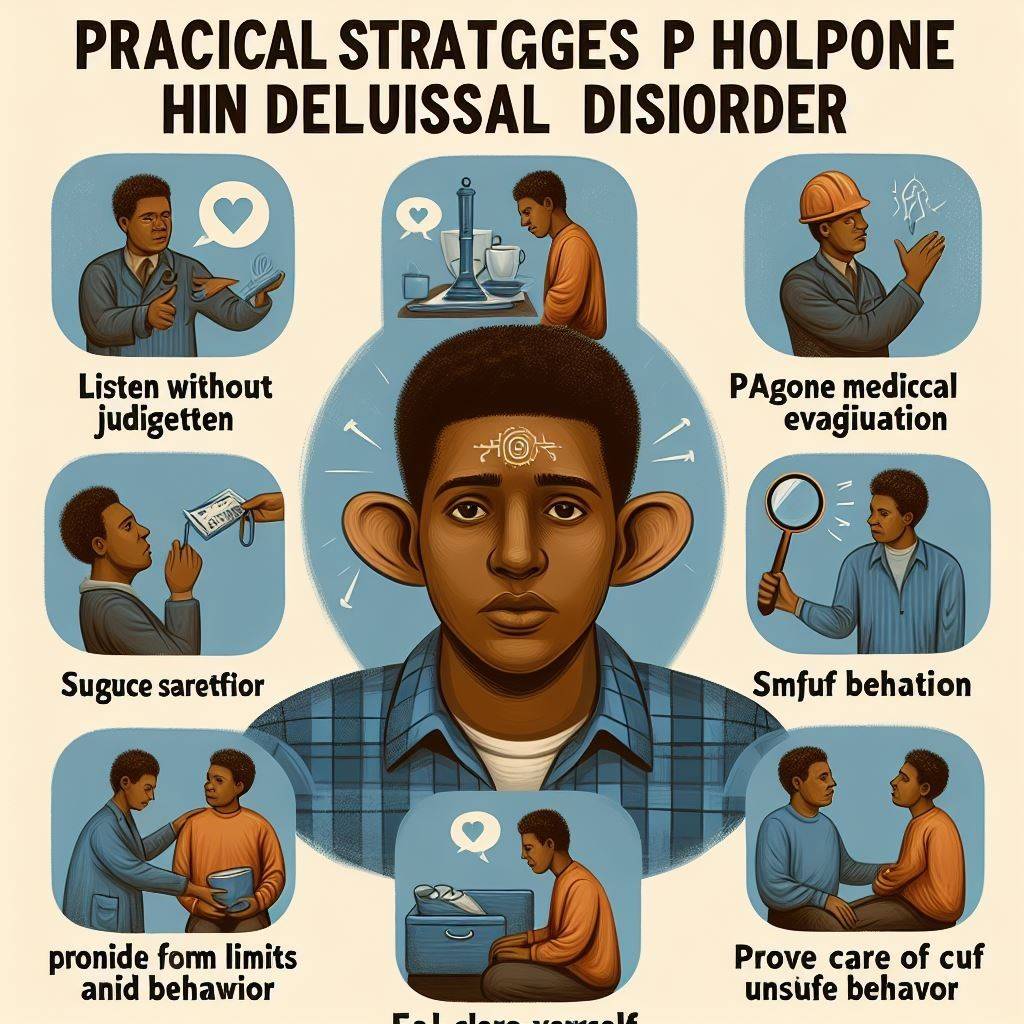How to Help Someone with Delusional Disorder: Practical Strategies
Navigating how to help someone with delusional disorder? Explore practical strategies like open communication, encouraging medical help, setting boundaries, and self-care.
Understanding Delusional Disorder
Discover actionable strategies on How to Help Someone with Delusional Disorder, a mental health condition characterized by non-bizarre delusions. Learn how to enhance communication, set boundaries, and prioritize self-care despite evidence to the contrary. Unlike schizophrenia, delusional disorder rarely involves hallucinations or other significant disruptions in thought or behaviour.
People with delusional disorder often present themselves as rational and coherent, making it challenging to recognize their need for help. However, their delusions can profoundly affect their lives, relationships, and overall well-being.
Signs and Symptoms of Delusional Disorder
The primary symptom of delusional disorder is the presence of one or more non-bizarre delusions. How to Help Someone with Delusional Disorder can be challenging, but practical strategies can make a difference.
- Persecutory delusions: Belief that they are being conspired against, followed, or mistreated.
- Jealous delusions: Conviction that their partner is unfaithful without evidence.
- Somatic delusions: False beliefs about having a medical condition or physical defect.
- Grandiose delusions: Unrealistic beliefs about their importance, power, or identity
Other potential signs include:
- Preoccupation with the delusion(s)
- Attempts to convince others of their beliefs.
- Anxiety, anger, or distress related to the delusion(s)
- Social isolation or strained relationships
- Table: Common Delusion Types and Examples
| Delusion Type | Example |
| Persecutory | The belief that the government is spying on them |
| Jealous | Conviction that their partner is having an affair |
| Somatic | False belief that they have a terminal illness |
| Grandiose | Unrealistic belief about being a powerful leader |
Potential causes of delusional disorder
The exact causes of delusional disorder are not fully understood, but several factors may contribute to its development.
- Brain chemistry imbalances: Abnormalities in brain chemicals like dopamine, serotonin, and glutamate may play a role in the formation of delusions.
- Brain structure changes: Some studies have found differences in brain structure and function in individuals with delusional disorders, particularly in areas responsible for reasoning and perception.
- Genetics: Delusional disorder may have a genetic component, as it tends to run in families.
- Environmental factors: Traumatic life events, social isolation, and high levels of stress may increase the risk of developing a delusional disorder.
- Substance abuse: The use of certain substances, such as amphetamines or hallucinogens, has been linked to the onset of delusional disorder in some cases.
- Medical conditions: Certain medical conditions, like brain tumors, head injuries, or metabolic disorders, can sometimes contribute to the development of delusions.
How to help someone with a delusional disorder can involve strategies like open communication, encouraging medical evaluation, providing reassurance and support, setting firm limits on unsafe behaviour, and taking care of oneself.
Practical Strategies for Helping Someone with Delusional Disorder

Helping someone with a delusional disorder can be challenging, but these practical strategies can make a difference. How to Help Someone with Delusional Disorder is a mental health condition characterized by non-bizarre delusions. Learn how to enhance communication, set boundaries, and prioritize self-care despite evidence to the contrary. Unlike schizophrenia, delusional disorder rarely involves hallucinations or other significant disruptions in thought or behaviour.
- Establish Trust and Open Communication
- Listen without judgment or criticism.
- Validate their emotions, even if you can’t validate their beliefs.
- Use “I” statements to express your perspective respectfully.
- Avoid confrontation or attempts to argue away their delusions.
- Encourage Medical Evaluation
- Suggest a medical evaluation by a mental health professional.
- Frame it to explore potential underlying causes.
- Offer to accompany them to appointments for support.
- Provide Reassurance and Support
- Remind them of your care and concern for their well-being.
- Help them identify and engage in positive coping strategies.
- Encourage participation in enjoyable activities and social connections.
- Set Firm Limits on Unsafe Behavior
- Establish clear boundaries around behaviours that could be harmful.
- Remain calm and consistent in enforcing those boundaries.
- Seek professional help if there is an immediate risk of harm.
- Take Care of Yourself
- Seek support from others who understand your situation.
- Practice self-care activities to manage stress and avoid burnout.
- Consider joining a support group for loved ones of those with mental illness.
Involving Professional Help
While practical strategies can help, professional treatment is often necessary for managing delusional disorder. Treatment options may include:
- Antipsychotic medication: To help reduce the intensity of delusions.
- Psychotherapy: To explore the delusions and develop coping mechanisms
- Family therapy: To educate loved ones and improve communication.
- Hospitalization: In cases of severe impairment or risk of harm
It’s crucial to be patient and persistent in encouraging someone with delusional disorder to seek professional help, as their delusions may make them resistant or distrustful.
Maintaining a Supportive Environment
Creating a supportive environment can be invaluable for someone with a delusional disorder. Consider these tips:
- Avoid validating or engaging with their delusions.
- Redirect conversations to more positive topics.
- Encourage participation in activities and social interactions.
- Maintain a calm, non-confrontational approach.
- Celebrate minor victories and progress.
Remember, recovery is an ongoing process, and setbacks may occur. Consistency, compassion, and professional support can help navigate the challenges.
FAQs: How to Help Someone with Delusional Disorder
Q: What is the best treatment for delusional disorder?
A: The best treatment for delusional disorder typically involves a combination of antipsychotic medication to help reduce the intensity of delusions and psychotherapy to explore the delusions and develop coping mechanisms. Family therapy and support groups can also be beneficial.
Q: How to calm down a delusional person?
A: When someone is experiencing intense delusions, it’s important to remain calm and avoid arguing or convincing them their beliefs are false. Instead, validate their emotions, use a gentle tone, and redirect the conversation to more positive topics. If the situation escalates or becomes unsafe, seek professional help immediately.
Q: How do you get a delusional person to seek help?
A: Getting a delusional person to seek help can be challenging, as their delusions may make them resistant or distrustful. It’s important to approach the topic with empathy and suggest a medical evaluation to explore potential underlying causes, rather than directly challenging their beliefs. Offer to accompany them to appointments for support and involve their trusted friends or family members in the process.
Q: Can people with delusional disorder live a normal life?
A: With proper treatment and support, many people with delusional disorders can learn to manage their delusions and live relatively normal lives. However, the degree of impairment can vary depending on the severity and type of delusions. Some individuals may require ongoing medication and therapy, while others may experience periods of remission with minimal disruption to their daily functioning.
Conclusion: How to Help Someone with Delusional Disorder
Helping someone with a delusional disorder requires patience, empathy, and a delicate balance of support and boundary-setting. By understanding the condition, communicating openly, and involving professional help, you can make a positive difference in their journey toward better mental health.
Remember to prioritize your well-being and seek support when needed. With the right strategies and a compassionate approach, you can help your loved one manage their delusions and improve their quality of life.
How to help someone with delusional disorder is a complex challenge, but one that can be navigated with the right knowledge, resources, and support system in place.

Adel Galal is a health and wellness writer with over 30 years of experience studying and writing about health, fitness, nutrition, and healthy living. He is the founder of NextFitLife.com, where he shares practical, evidence-based guidance to support long-term health at any age. Adel’s mission is simple:
to help people make smarter health choices that fit real life, at any age.



